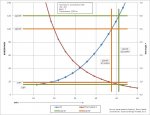Martman
Seaman
- Joined
- Aug 23, 2009
- Messages
- 60
I am need of an outboard motor for my 16.5 open bow. I have found 2) a dealer fresh rebuilt 1979 Evinrude 100 with warranty. I have also found a 1987 Johnson 120 VRO, rebuilt a couple of years ago with 30 day warranty. The rebuilt 100 is cheaper than the 120. Is the 1979 engine obsolete or is it still a good engine to work with. It will not be used many hours a year.
I am replacing a shot 120 VRO, but will the 100 do the job for me I am more concerned with fuel economy than total performance. If the 100 will run me decent speed 30-35 mph I would be content.
I am replacing a shot 120 VRO, but will the 100 do the job for me I am more concerned with fuel economy than total performance. If the 100 will run me decent speed 30-35 mph I would be content.




















